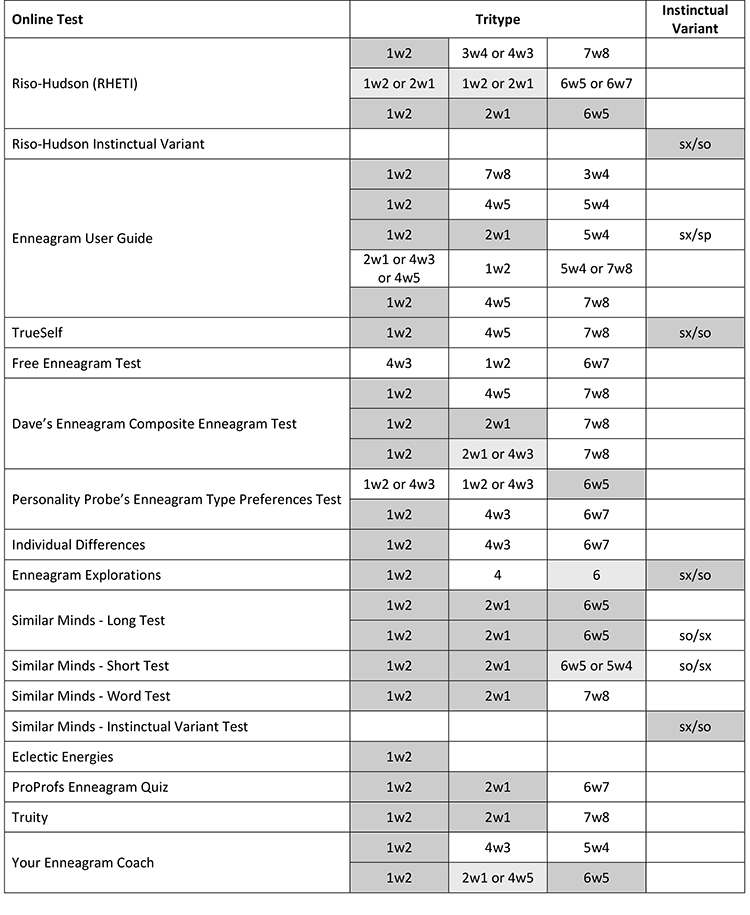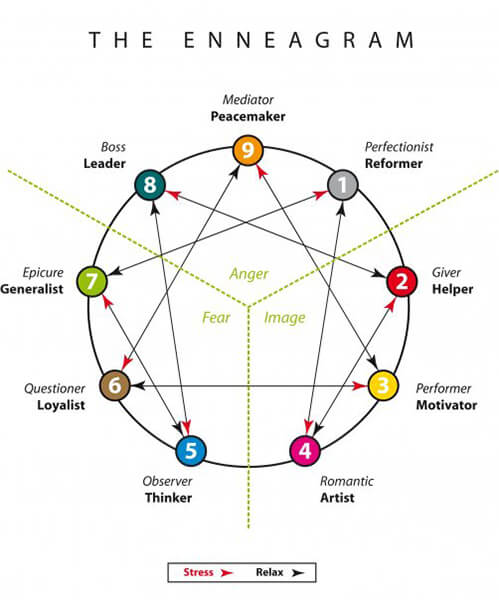The Interview
Because I was still uncertain about my Enneagram type, I decided to “bite the bullet” (financially) and sign up for a one-hour session with the ultimate expert, Katherine Fauvre. In preparation for this meeting, I took the most recent version of her online test, which identified my type as 145 sx. I had previously taken earlier versions of her online tests a few times, starting in 2019, but the tritype results were a bit inconsistent (146, 126).
Our Zoom session was scheduled for Monday, September 26, 2022. Although some local internet problems at her location (California) delayed the start of our session, Katherine was extremely generous with her time. Most of the first hour was a more general discussion about methods of typing and intricacies of constructing an online test that would yield correct results. Then we focused in on my most recent test.
The Analysis
Katherine concluded that I am an atypical 146 sx; apparently an INFP with sx is not common. She noted that in my EnneaSpread results, there was a 7 card. This suggests that I swing between the 5 and 7 and am most likely a 6 fix in the third position. With 4 plus sx in the tritype, the need for individuality is amplified. Because 1 has a line to 4, the desire to find meaning and a sense of purpose is strengthened. For me, rules are important but with a higher purpose. Katherine discusses the 146 tritype, “The Philosopher,” on YouTube. This type also had showed up on one of the tests I took in 2019.
According to Katherine, the type in the first position in a person’s tritype makes a difference. Sexual 1s are great mentors, leading with an inner authority rather than doubt (as a 6 would). As I previously mentioned, Katherine said that I slide between 5 and 7. The 5 accounts for part of my introversion and indicates that my “need to know” is a defense mechanism. It is likely that my scores for 5 and 6 were close. I was surprised to learn that Katherine views instinctual aspects as more important than a person’s tritype. Looking back on my life, I can see many instances where the desire for intimacy, connection, and one-to-one relationship has been a significant force, so I would have to conclude that she is right about this.
The Aftermath
The lengthy discussion with Katherine hit me harder than I had anticipated. Perhaps this was partially because I was already feeling stressed by some website problems at work that had recently arisen. In any case, I realized how difficult it is to reconcile the qualities of the perfectionistic 1 with the needs of my primary instinctual type for intimacy. I can see how this has played out in my life over the years, and not with particularly positive results.
Following the session, I decided to share Katherine’s conclusions with Rob Zeke Collopy, who had recommended that I get typed by Katherine. Rob said he sees me as the 146. He thought that I perhaps had a 6 in my tritype [rather than 5] because I am “more of an investigator,” with the “need to feel secure in the knowledge that [I] know.” He concurs that I do “seem like a 1, especially the sexual 1, which is kind of the interesting-looking, atypical 1, also the rarest type.” Rob knows only four people who are sexual 1s, the least number of all the types. With the “LEVF on top of that, it’s super fascinating: very visionary, future-oriented; and put the sexual in there, so it’s like the need to find ideal love and…somebody who fits [my] standards on top of it…it’s tough!” Rob is right about that!
My Assessment
There seem to be some significant differences among Enneagram practitioners on the names and characteristics of the instincts. While I understand that alliteration is a clever way to identify them (Self-Preservation, or sp; Social, or so; and Sexual, or sx), the common usage of these terms can be misleading. One of my sources cites Sikora, who calls sp the “Preserving instinct” with a primary focus on physical survival, maintenance, and sustenance; so, the “Navigating instinct” which focuses on our relationship with one or more people and with society as a whole; and sx, the “Transmitting instinct” where the main focus is on attracting a sexual partner, procreation, and transmitting (a part of) ourselves to others through children or creative endeavors. This view rejects the idea that sx includes the urge to have a strong intimate relationship with one other person, which Russ Hudson says is a matter of the Heart center.
In contrast, Katherine Fauvre describes Self-preserving as “the drive to seek safety and security and a sense of well-being”; Social as “the drive to seek others, to belong and be part of a group or community”; and Sexual as “the drive to seek personal affinity, closeness and one to one relationships.” Since the test I took was based on these definitions, not those of Sikora as described above, I choose to understand my preference for sx as defined by Katherine. This means that I desire to have affinity and a deep bond “with significant others, whether a lover, parent, child, sibling, friend or co-worker.”
While I have never experienced the close bond with a boyfriend or spouse that I wished to have, I nevertheless have seen the successful establishment of such bonds with other significant people in my life. In childhood, my mother was the one with whom I shared the closest ties. During my adult years, I experienced several friendships that were deep and meaningful. One friend had been a student of mine at Fraser High School. Another was a woman I met at Macomb Community College, where both of us were taking computer programming classes. Nancy and I could talk about anything comfortably. Even if we could not get together for a period of time, we could pick up again as if no time had passed. My friendship with Nancy spanned nearly three decades, ending with her untimely death in December 2018. At that time God blessed me with a new friendship with a couple at my church. I could also mention several co-workers who became close friends over the years, including my cousin Mary Jane with whom I worked for over fifteen years at Wayne State. In my thirties and forties I experienced a strong bond with my late father, having discovered that we had a number of traits and priorities in common.
Another aspect of my Enneagram results is important to note. The degree to which any aspect of my tritype and/or dominant instinct has impacted my behavior has varied greatly over the years. I can see that as I have grown older, I have become less influenced by my dominant instinct. I prefer to avoid pursuing closeness with another person until I have ascertained that he or she shares similar values and can be trusted. Through bitter experience I have learned that it is much better to be alone than to try to maintain a close bond with someone who does not share my values and priorities and/or proves to be untrustworthy. On the positive side, I can see in my own life that sexual 1s can make great mentors.

